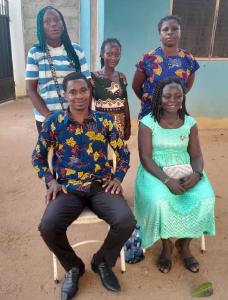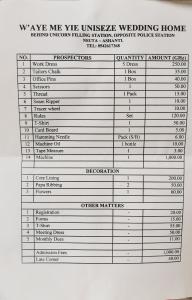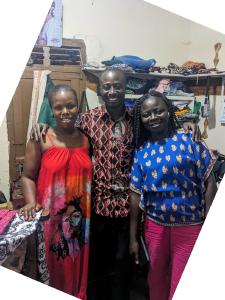Apprentices in tailoring and other trades, in Nsuta
Rationale and planning
During the course of our work, Turbo Ghana has constantly found the need to help young people develop their careers and improve their prospects. This has led to the idea that we could fund apprenticeships. We tried to initiate apprenticeships in solar power installations, since there is a dearth of local expertise even though it seems an obvious development for African countries that have a lot of sunlight. However, as of December 2023 we had not succeeded in finding candidates and local apprenticeship hosts for this profession. We haven’t given up, but we decided to try apprenticeships in trades that are more familiar to the communities we serve.
Tailoring apprenticeships
Samuel Bediako is a senior teacher in Nsuta and introduced us to four women that want to pursue careers in dressmaking but can’t afford the apprenticeships. The women have identified a Nsuta dressmaker and shop owner Mary Ode as a possible host for their apprenticeship, and also another dressmaker and shop owner in the same street called Kwame Kyere. Both Mary and Kwame are experienced apprenticeship hosts, having had several apprentices before. We initially thought of selecting one or two of the women, but we decided to allow all four of them to start, two with each host, recognising that a certain drop-out rate is inevitable for all sorts of reasons.
Two of the women are about 20 years old, and two of them are 30. This is a good mix of ages. The younger ones may have the advantage of being a more typical age for an apprenticeship, but the older ones have already suffered from inadequate employment opportunities and, since they’re more knowledgeable about the risks of failure, are more likely to work hard to succeed.
Dressmaking and tailoring is an important business in Ghana, and these women are likely to be easily able to find jobs with existing businesses, or start their own business. Turbo Ghana may consider funding start-up costs when the time comes (this will be decided on an individual basis, according to the apprentice’s performance and the business prospects).
Costs to be funded
The women all live in Kruwi, which is some distance from Nsuta. Turbo Ghana will rent two rooms in Nsuta to accommodate the women during the week. We considered paying for their transport instead, but it turned out to be more expensive, and also less convenient. They will also need a sewing machine (1000 cedis), and the trainer requires a fee of 1000-1500 cedis. The trainers Mary and Kwame have given us their “prospectus”, which is the list of start-up costs for an apprentice (Kwame’s one in the photo).
The following table shows the approximate costs we intend to fund (in £GBP), for each apprentice for their three-year apprenticeship:
| Item | Cost per month | Cost for 3 years |
|---|---|---|
| Accommodation | 10 | 360 |
| Living equipment (mattress, etc) | 100 | |
| Water + electricity | 5 | 180 |
| Sewing machine + other tools | 100 | |
| Stipend | 35 | 1260 |
| ——— | ——— | |
| Total (approx) | 2000 |
Although we are starting with four apprentices (March 2024), we aim to expand the scheme to 10 or 20 by next year (2025). So our budget requirement for this project is £20,000–£30,000.
Progress monitoring
Our host and friend Vivian (right) knows one of the trainers (Kwame) and she lives nearby, so she will kindly monitor the progress of the apprentices on behalf of Turbo Ghana. Senior teacher Samuel Bediako (who introduced us to the women) will also monitor; he also lives nearby. Kwasi (centre) will also visit when he is in the area. Mark is in daily WhatsApp contact with Kwasi and regular WhatsApp contact with Vivian and Samuel and the two trainers.


